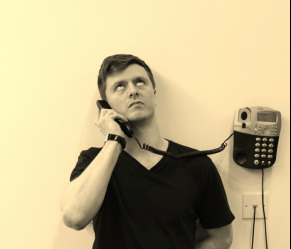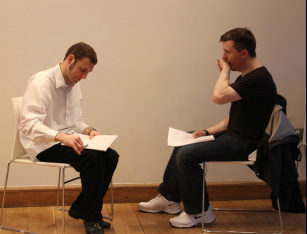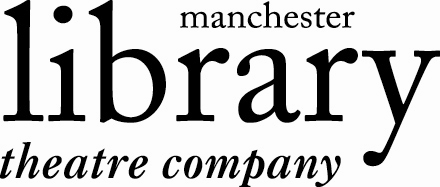Well, premiere day is finally upon us!
And after a final round of rehearsals (and seeing how fantastic the set looks), we’re feeling good and confident about tonight. Before we open later, we just wanted to say thanks to the cast for their hard work over the last six months, and good luck!
We also want to thank you for visiting and following our humble Honest blog this past few weeks. If you like what you’ve read here and want to get involved with LTCC, simply click on the tab above or visit the Library Theatre website for more details.
We hope you enjoy the performance!

With just a week to go until curtain (!) the Community Company cast are hard at work in the rehearsal room. We hope you’re as excited about the show as we are!
Recently, we sat down with Community Company stalwart Tom Burke, to get his thoughts on what you can expect from the show and his character, and his overall experience with the Community Company itself. Here’s what he had to say:
Tom, tell us in your own words about the show.
It’s about a poor guy called Honest, hence the title, played by Steven Ireland who works as a Sanitation Deployment Manager. He has a bit of a dead-end job really and as the show progresses he finds himself in this bizarre, surreal world, with some really strange characters.
Tell us about your character.
I play the slimy Chubb Hudson, who works in the same department as Honest and hates it, although Chubb does his best not to take any notice of the poor guy. As with a lot of the characters, you’ll see that Chubb isn’t what he appears to be. As the show continues, you’ll see he’s even less pleasant than you think!
Who have you based him on?
I’ve tried to base some of how he is on how I used to be with one of my brothers. When I was a lot younger, I always thought he was out to tease me, so we didn’t really get on. Thankfully, now we’ve grown up, we’ve come to this really good place in our relationship and reconciled our differences.
My brother had a job which meant he had to work long hours, a bit like Honest, but I didn’t respect that at the time. Admittedly, I blanked and ignored him quite a lot, and I’ve tried to channel this into Chubb, and the way he snipes at Honest.
Chubb is a bit of a horrible and greedy character in this play, and I’ve tried to imagine how I was back then and exaggerated it. I think the relationship between Chubb is a bit like a big brother/little brother dynamic. Honest wants to reach out to Chubb and help him, be his friend, but Chubb despises authority and isn’t really interested.
Tell us about the Library Theatre Community Company.
I’ve been involved with it since 2011. It’s great for everyone - people in their 20s like me, older people in their 60s or 70s, or anyone in between. It’s headed by the very capable Rosie Stuart, who I’ve gotten to know quite well, and Adam Gilmour. We all meet up to collaborate on a weekly basis in Manchester, and over intervening months, we’ll begin to create our own stories and our own characters, many of which have some basis in reality as most of our productions have been original.
What do you enjoy about the group the most?
Well, speaking for myself personally, the fact that we don’t focus too much on Shakespeare or musical theatre is a plus! And you get the chance to create and show audiences mature, grown up and down-to-earth stories.
Working with the group has helped me enormously as a budding actor. It has taught me different ways of doing and saying things based on the story we all create together. Rehearsing for a big performance can be quite taxing, but it’s always rewarding in the end (not to mention euphoric and uplifting!) I’ve also found that this group has helped me to develop skills which I can use elsewhere in my life. It’s really given me the inspiration to aim for something and succeed at it.
Any tips for young budding actors?
Let’s see… I would say to learn the lines for your scenes as religiously as possible. Get the dialogue absolutely glued to your brain. A lot of actors starting out make the mistake of just concentrating on their own lines, but it’s vital to learn the lines of the person you’re working with as well. Not just so you can hit your cues, but so you can anticipate how to emotionally react to them, in terms of movement and body language.

Interpreting dialogue from the page can be a tricky process for an actor starting out. Particularly in theatre, a character’s lines might not always be what they seem. Often a character might say one thing but mean something else entirely.
The idea of the Honest project has been for workshop members to develop their own characters, their personalities, traits and mannerisms – and delivery and inflection are integral parts of this process. It was for this reason that, when writing the script, I completely omitted the use of any directional adverbs (such as [angrily] [sarcastically] [worriedly] etc.). What we really wanted was for the group to come up with their delivery styles on their own.
To help them achieve this, Rosie came up with the following ‘Aims and Objectives’ exercise. This involved them getting into pairs with scene partners, and assessing each line one by one to determine the motivation behind what their characters were saying.
So, for instance, let’s take an excerpt from a scene between Honest and Chubb:
HONEST: Chubb? Hiya mate!
CHUBB: Oh for God’s sake.
HONEST: Fancy seeing you here. How’s it going?
CHUBB: Brill.
HONEST: So this is your regular watering hole is it?
CHUBB: For now yeah.
Here, we’ve got an exchange between two characters with utterly different attitudes towards each other.
On one hand, Honest is really making the effort with Chubb. By greeting him, Honest is indicating that he wants to befriend Chubb and get into a conversation.
So, at its most basic, ‘Hiya mate!’ actually means: ‘Hey. I want to be friends. Talk to me.’
Chubb, however, doesn’t want to know, and makes that clear:
‘Oh for God’s sake’ is a thinly veiled way of saying: ‘Oh no. Not you again. I don’t like you.’
By repeating this process for the rest of the scene, we get something like this:
HONEST: Chubb? Hiya mate! (Hey. I want to be friends. Talk to me.)
CHUBB: Oh for God’s sake. (Oh no. Not you again. I don’t like you.)
HONEST: Fancy seeing you here. How’s it going? (I’m making the effort. By asking him how he is I might get him to open up to me.)
CHUBB: Brill. (LEAVE ME ALONE.)
HONEST: So this is your regular watering hole is it? (I’m persevering.)
CHUBB: For now yeah. (But not for much longer, if people like you are coming down here now.)
After this process, Rosie got the pairs to act their scene out in front of the rest of the group – but openly stating their intentions behind their lines to the audience, before actually speaking them.
What we noticed then was a lot more authenticity and feeling behind their delivery. Characters’ motivations were fresh in their minds, and they were now revealing their real intentions through the way they delivered their dialogue.
As with most characterisation exercises for actors, this process is also incredibly useful for writers trying to work out the true meaning behind their characters’ dialogue. When writing a script, I’m often guilty of writing lines which might appear different from those preceding it, but actually mean the same thing. An exercise like this is particularly helpful in highlighting duplicates, and determining which lines you can afford to lose to tighten things up.




 RSS Feed
RSS Feed